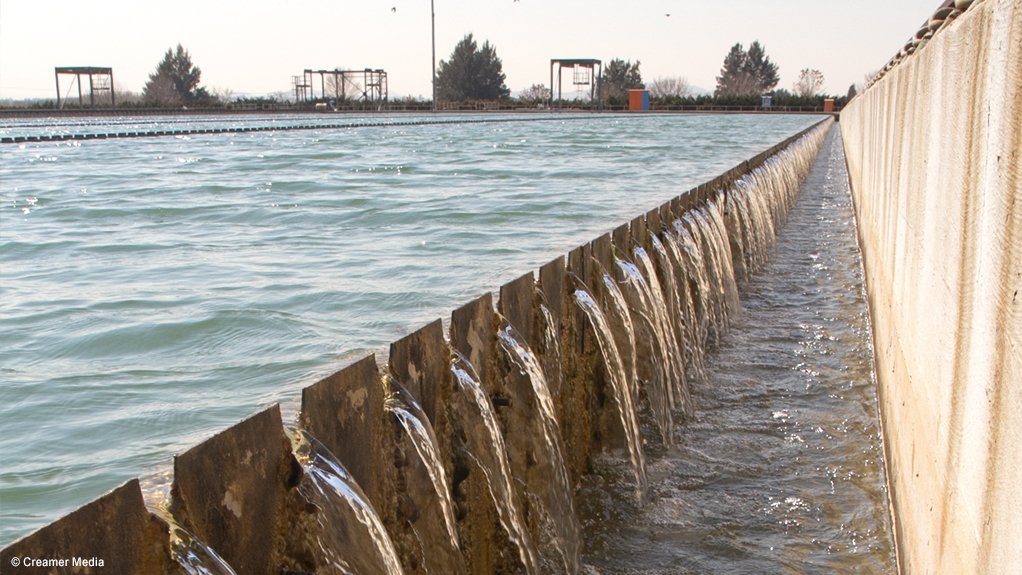Rand Water’s ‘reimagination’ of value chain in execution
Water utility Rand Water is working towards “reimagining” South Africa’s water sector – and its own value chain – by leveraging advanced technologies and new innovations that could help solve the various challenges facing the bulk water supplier and its customers.
During an online information session hosted by the Southern African-German Chamber of Commerce and Industry, Rand Water innovation and new technologies manager Mogan Padayachee said that the utility was reviewing and implementing a range of resilient strategies.
Water demand was exceeding supply, with high levels of water use by industries and consumers and high levels of water waste and nonrevenue water, exacerbated by challenges with electricity, he commented.
“We have adopted a climate-resilient approach. We have enhanced and modernised our communications. We are investing R35-billion over the next five years in terms of maintenance and augmentation projects, with 60% allocated for new infrastructure and 40% for operations and maintenance of existing infrastructure, together with repairs. We created a formidable project in terms of renewable energy,” he said.
Further, Rand Water is midway through one of its most intensive routine maintenance programmes.
Amid all of this, he said, Rand Water was dedicated to reimagining the water sector and the utility’s value chain, with new innovations in execution across the board.
“Our strategy at Rand Water is an innovation-driven, risk-based strategy, where we look at all the risks that are currently impacting our organisation and how we go about mitigating that.”
“The future of the water sector is going to be built on data. This is going to have a tremendous positive impact in terms of how we respond and moving towards a proactive water utility,” he said, noting that Rand Water was starting to adopt, at full scale, several innovations and technologies for the utility, and within its customer base as well.
In terms of maintenance programmes, Rand Water is starting to move towards non-interruptive, non-disruptive repairs where flow and pressure are not restricted, while some new innovations and advancements are emerging that can deliver non-destructive testing, and inspection of pipes and valves using data analytics and smart technologies.
As Rand Water seeks to diversify its sources of water, it is heavily investing in groundwater sources and using satellite technologies to find groundwater and create decentralised water treatment systems.
A low hanging fruit in its climate resilient and water efficiency strategies is water reuse, not just from operations and maintenance, but also ownership of water, wastewater or water recovery facilities, where the group is looking at reusing this water and treating it to different standards.
“There has been a lot of discussion about treatment of mine water. We have a huge research and development focus in terms of recovery of the brine and reuse of that using circular economy approaches and technologies,” said Padayachee.
Rand Water is also investing significantly into nonrevenue water reduction, which is another low hanging fruit that South Africa has failed to arrest over the last few years. Currently the national nonrevenue water is between 42% and 45%, compared with Rand Water’s nonrevenue water of 3% to 4%.
“There are extensive programmes and projects in terms of reduction of nonrevenue water, including the use of satellite technologies, which cover the entire area of supply to identify leaks on our drinking water pipelines.”
In addition to fixing pipes to reduce nonrevenue water in a proactive manner, Rand Water is deploying acoustic sensors and transient monitoring systems to be able to predict leaks before they happen, leveraging data and algorithms.
“We are investing heavily in automated metering infrastructure, or smart meters, which provide a direct line of visibility across the value chain from bulk into reticulation,” he continued.
“We want to have full sight of the value chain. To understand consumer behaviour patterns and influence consumer behaviour, and to make a tangible difference in terms of reduction of leaks, we need to have full sight of the value chain.”
This line of sight on how water is being used and where it is being lost will enable a quicker response rate by the utility.
“We are investing a lot of money and funds of our own in terms of understanding new technology, derisking at a full scale level and then implementing. There has never been a more exciting time to be in the water sector with the plethora of solutions that are now available to create resiliency.
“We have a lot of data and in the next couple of months, Rand Water is going to be profiling some of the technologies in terms of the use of data and generative artificial intelligence to enhance operations and maintenance and moving towards predictive burst modelling,” Padayachee said.
Rand Water is also tackling the challenge of vandalism on some of its Internet of Things devices within its distribution network through a vandal-proof smart lock system, which is currently being patented and which will protect the instrumentation.
Meanwhile, Rand Water is investing significantly in hydroenergy.
“We supply water over very long distances of 3 500 km and the pressure in those pipes are between 20 and 40 pounds average. So we want to be able to recover some of that energy. We are now in the process of installing hydro turbines and we are looking at microturbines to actually power some of our instrumentation in our distribution system.”
Johannesburg Water is also implementing similar technologies and innovations to arrest the decline in the water reticulation sector.
“Johannesburg Water is the only municipality in the country that has a dedicated office looking at research, development and innovation,” Municipal Infrastructure Support Agecy innovation and technology manager Dr Zakhele Khuzwayo said, noting that, with a limited budget, the utility had to be creative.
“We are very big on piloting and demonstrating any technology that comes within the shores of Joburg Water, [however,] it needs to be better coordinated for us, meaning that of course we need to pilot it. We cannot then risk perhaps spending millions on something without having at least empirical evidence of its use.”
The teams, comprising finance, project management, engineering and planning experts, are working to ensure that whatever technology, innovation or projects that are considered are sustainable solutions.
“We are not just plugging holes anymore. We are trying to deal with the whole issue holistically. This will provide us a better chance of winning in the long term,” he said.
However, beyond the technology itself, there is also a need to review operational maintenance.
“It is a balancing game.”
Article Enquiry
Email Article
Save Article
Feedback
To advertise email advertising@creamermedia.co.za or click here
Press Office
Announcements
What's On
Subscribe to improve your user experience...
Option 1 (equivalent of R125 a month):
Receive a weekly copy of Creamer Media's Engineering News & Mining Weekly magazine
(print copy for those in South Africa and e-magazine for those outside of South Africa)
Receive daily email newsletters
Access to full search results
Access archive of magazine back copies
Access to Projects in Progress
Access to ONE Research Report of your choice in PDF format
Option 2 (equivalent of R375 a month):
All benefits from Option 1
PLUS
Access to Creamer Media's Research Channel Africa for ALL Research Reports, in PDF format, on various industrial and mining sectors
including Electricity; Water; Energy Transition; Hydrogen; Roads, Rail and Ports; Coal; Gold; Platinum; Battery Metals; etc.
Already a subscriber?
Forgotten your password?
Receive weekly copy of Creamer Media's Engineering News & Mining Weekly magazine (print copy for those in South Africa and e-magazine for those outside of South Africa)
➕
Recieve daily email newsletters
➕
Access to full search results
➕
Access archive of magazine back copies
➕
Access to Projects in Progress
➕
Access to ONE Research Report of your choice in PDF format
RESEARCH CHANNEL AFRICA
R4500 (equivalent of R375 a month)
SUBSCRIBEAll benefits from Option 1
➕
Access to Creamer Media's Research Channel Africa for ALL Research Reports on various industrial and mining sectors, in PDF format, including on:
Electricity
➕
Water
➕
Energy Transition
➕
Hydrogen
➕
Roads, Rail and Ports
➕
Coal
➕
Gold
➕
Platinum
➕
Battery Metals
➕
etc.
Receive all benefits from Option 1 or Option 2 delivered to numerous people at your company
➕
Multiple User names and Passwords for simultaneous log-ins
➕
Intranet integration access to all in your organisation





















